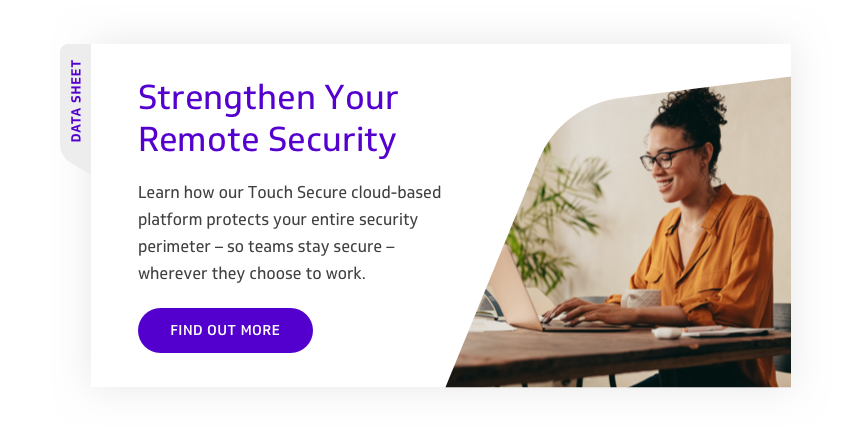BLOG
Remote Working is Old News: The Future is Hybrid
Remote working has been a big topic of discussion for businesses in the last year. There's been talk about everything from its immediate advantages or challenges to the long term changes it will likely bring about. So, organisations are beginning to look ahead and consider – is remote working here to stay?
It's not hard to see why. 87% of office workers want the flexibility to work from home at least one day per week post-pandemic. Additionally, more than 20% of the global workforce could work remotely three to five days a week as effectively as if working from an office. This will impact everything from transportation and the environment to how businesses manage employee retention and expectations. And many of these changes will persist for years after the COVID-19 pandemic.
But what if we told you the term ‘remote working’ has rapidly become outdated?
What is Hybrid Working?
Hybrid working is a term used to describe a model that combines working from home, the office, and remote locations. This gives workers greater autonomy and flexibility over where they work. It's also sometimes known as 'working from anywhere'.
Hybrid working is quickly replacing remote working as an option to manage workforces. Yet for hybrid working to be effective, companies must implement the technology and controls to keep their IT infrastructure secure. While working with a 'hybrid' model offers greater flexibility, it also means that employees are split across multiple locations while accessing sensitive data or networks.
Why will Hybrid Working Become the Norm?
Remote working has provided businesses with a safe method of working while the COVID-19 pandemic continues to impact daily life. And it has come with many benefits; better work-life balance, reduced commuting times, money savings, and more.
While many people miss face-to-face interactions that come with office life, it's also likely that most employees still want to make the most of the benefits of working from home, if not for only a few days of the working week. This means that hybrid working that combines the office and home will become more common.
The advantages of the hybrid working model include:
- Increased productivity
- Greater sense of autonomy
- Job satisfaction
- Money savings
- Less environmental impact
- Flexibility
To unlock these benefits, your business must prepare your IT infrastructure. This will allow employees to work securely from anywhere, and help your business control IT security, support, and costs that inevitably creep up in a more complex IT environment. How can you achieve this?
The IT Requirements of Hybrid Working
Remote IT Management
With employees working across multiple locations, it's essential that your IT teams can provide technical support from anywhere. However, when IT support falls squarely on in-house teams – fixing devices or applications remotely can become complex.
Teams can't be expected to travel to each employee's remote workspace, nor may workers want to travel into the office. Most importantly, technical issues will hinder productivity when the process for fixing them isn't instant. And a security breach could mean disaster without the systems in place to remotely control your networks.
To overcome this, a trusted managed service provider (MSP) can support and assist your teams as they are well-equipped to help you manage IT requirements in a hybrid working world. They can manage your networks from one, centralised system, and improve visibility across your entire network infrastructure. With greater visibility, they can identify technical network or security issues and address them in real-time.
An MSP can also fully-manage the devices and networks your employees use. They achieve this by implementing access to servers in geographic locations that are closer to end-users and issuing regular software-enabled security updates to protect your IT infrastructure.
Unified Communications
Communication tools or platforms allow teams to collaborate, remain productive, and overcome the limitations of physical distance. A cloud-based unified communications platform (UC) ensures that every team member can connect securely via a fully integrated single infrastructure, even when using their familiar, existing tools. Wherever employees are, our browser-based portal provides access to audio and video collaboration tools from any device, enabling them to keep communication flowing.
A unified communications platform is also easy to scale. It avoids the complications of buying or cancelling additional licenses across many employees, and helps your business remain cost-effective. Your business can continue to work remotely or in office and control the impact of any future changes to your working such as social distancing measures.
Security as a Service
As part of a managed service provider's security offering, you can benefit from implementing Security as a Service (SaaS). Cloud-based SaaS allows IT teams to manage security remotely with greater control. It includes features such as next-generation firewall services that provide both application control and an intrusion protection system, in addition to traditional firewall features. These features of SaaS are vital for secure hybrid working as they protect sensitive or business-critical data.
Furthermore, you can implement SaaS solutions on a subscription basis. This means you'll only pay for the capacity you need, lowering the operational costs of your security measures while making them easier to scale. An experienced MSP will also ensure that security services are up-to-date to keep your business futureproof.
Are you Prepared for the Future of Hybrid Working?
Whether you haven't even considered returning to the office or you're adamant that your workforce will fully return, it's likely that the benefits of working from home are here to stay. Offering your employees the flexibility to choose where they work will be key to retaining staff and managing employee happiness, productivity, and more. To ensure you and your workforce are ready for this new hybrid way of working, you need a reliable and secure UC solution that provides you with the flexibility to grow and adapt the solution to match changing business needs.
Subscribe to our newsletter
YOU MAY ALSO BE INTERESTED IN:




